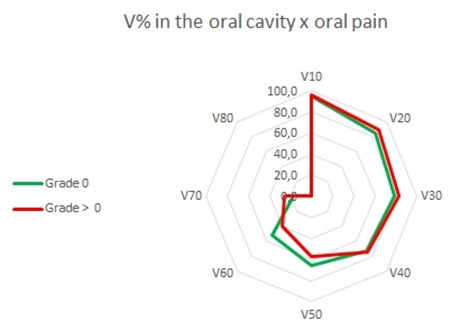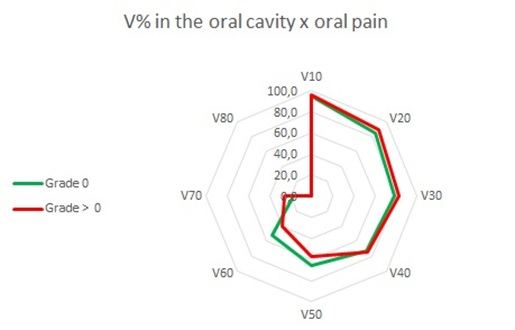
Figure 1 Incidence of complications assessed in patients with head and neck neoplasms submitted to conformational radiotherapy (3D), during treatment.

Figure 1 Incidence of complications assessed in patients with head and neck neoplasms submitted to conformational radiotherapy (3D), during treatment.

Figure 2 Relationship between the volumes of oral cavity and constrictor muscles of the pharynx irradiated and the development of dysphagia.

Figure 3 Relationship between the volumes of parotid glands and submandibular glands irradiated and the development of dry mouth.

Figure 4 Irradiated oral cavity and buccal mucosa volumes and the development of mucositis.

Figure 5 Relationship between the volume of oral cavity irradiated and the development of oral pain.

Figure 6 Relationship between the mean dose (Gy) received by each structure and the development of complications.
| Sociodemographic characteristics | Numbers (%) |
| Age (inyears)' | 60,2 ± 12,7 (38; 75) |
| Age group | |
| < 50 yearsold | 3 (27,0%) |
| 50-64 years old | 3 (27,0%) |
| > or =65 years old | 5 (46,0%) |
| Sex | |
| Female | 2 (18,0%) |
| Male | 9 (89,0%) |
| Proftsion | |
| Retired/Pensioner | 4 (36,0%) |
| Autonomous | 2 (18,0%) |
| Woodworker | 1 (9,0%) |
| Realtor | 1 (9,0%) |
| Bricklayer | 3 (27,0%) |
| •Mun = standarddl\'iatioo (Ma.ximwn ;Minimwn) |
Table 1. Sociodemographic profile of patients diagnosed with malignant lesions in the head and neck region attended at the Hospital de Câncer de Pernambuco.
| Variables | Numbers (%) |
| Smoking | |
| Yes | 8 (73,0%) |
| No | 3 (27,0%) |
| Alcoholism | |
| Yes | 9 (82,0%) |
| No | 2 (18,0%) |
Table 2. Life habits of patients with diagnosis of malignant lesions in the head and neck region treated at the Hospital de Câncer de Pernambuco.
| Clinical cha racteristics | Numbers (%) |
| Tumor diagnosis | |
| Squamous Cell Carcinoma | 11 (100%) |
| Tumor Location | |
| Oropharynx | 6 (55,0%) |
| Larynx | 2 (18,0%) |
| Oral cavity | 2 (9,0%) |
| Rhinopharynx | I (9,0%) |
| Degree of staging | |
| I | 0 (0,0%) |
| II | 2 (18,0%) |
| m | 2 (18,0%) |
| IV | 7 (64,0%) |
| Chemotherapy | |
| Yes | 8 (73,0%) |
| No | 3 (27,0%) |
| Surgery | |
| Yes | 4 (36,0%) |
| No | 7 (64,0%) |
Table 3. Clinical aspects of patients diagnosed with malignant lesions in the head and neck region treated at the Hospital de Câncer de Pernambuco.